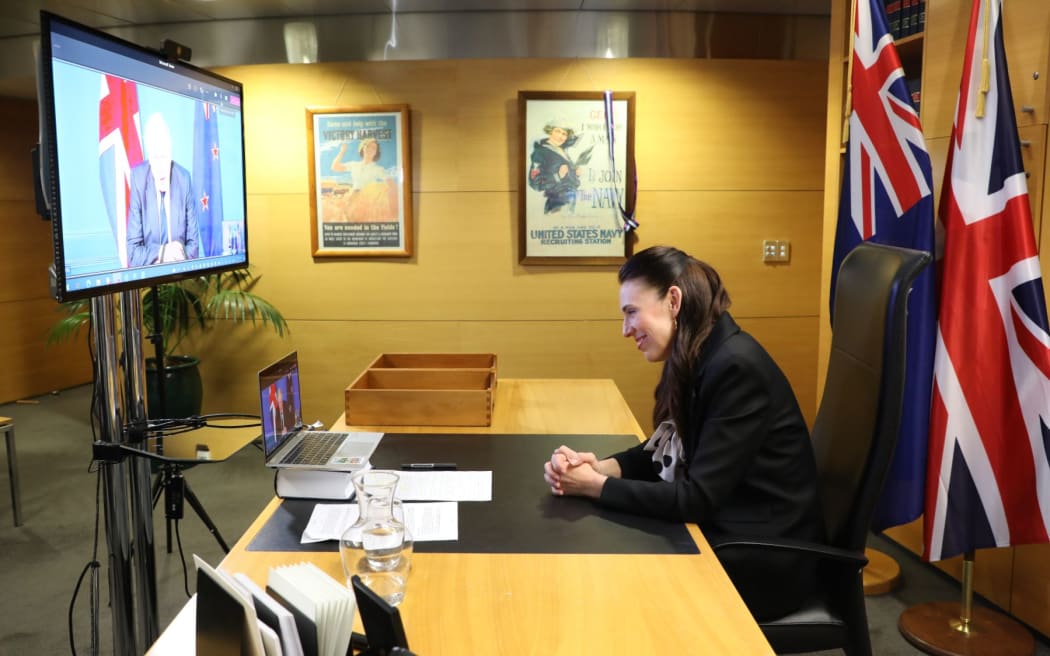
Prime Minister Jacinda Ardern and her British counterpart Boris Johnson speak via teleconferencing. Photo: Supplied
New Zealand’s agreed-in-principle free trade agreement with the United Kingdom has been lauded by politicians and exporters alike: Prime Minister Jacinda Ardern described it as one of our ‘best deals ever’, and the deal promised a boost of up to $1 billion in export earnings over the coming decade.
But then again … those groups would say that, wouldn’t they? After all, they’re the ones who’re selling it to us.
So what’s actually in the deal? What does it promise, and what does it deliver, when you delve behind the headline figures?
And why has a provision been snuck into this agreement relating to artists’, musicians’ and writers’ ownership of the work they produce, which could have big implications for creative sectors?
Today on The Detail, Emile Donovan speaks to Newsroom.co.nz foreign affairs and trade correspondent Sam Sachdeva, and Michael Wolfe, a copyright law expert at Tohatoha NZ, about the devil in the detail of this new FTA.
The agricultural sector is always front-and-centre in these sorts of deals, says Sachdeva – and on this particular occasion, it’s undeniable that our primary producers will be happy with how the deal has gone.
“There’s pretty good market access there in terms of dropping tariffs on our products – that’s where the big wins are, really.
“The headline figure is that 97 percent of product lines will have tariffs removed as soon as pen is put to paper.
“That is accurate, but the important part is the three percent that is going to be ‘staged in’: that takes up a large amount of what we actually send over there. They’re going to take a bit of time to remove all the tariffs on beef, lamb, and dairy, so in reality it’s going to be about 63 percent of our exports (by value) that are going to be tariff-free immediately, and about 35 percent that will kick in over five, to 10, to 15 years,” he says.
“What is also interesting: they’ve agreed to produce a chapter on indigenous trade, on Māori trade, which is pretty big, the first one like that we’ve had since our agreement with Taiwan.
“The devil was going to be in the detail there though – they’ve agreed to develop a chapter, they haven’t actually written it yet, so it seems there’s a bit more work to go in. But depending on what comes out of that, it could be quite significant for Māori businesses in New Zealand.
“Otherwise, there are some strong commitments in there about the environment and labour markets.”
One interesting – and somewhat under-reported – element of the deal is a provision which would extend New Zealand’s copyright term from the creator’s life plus 50 years, to 70 years after the creator’s death.
This would bring New Zealand in line with the UK, Australia, and the USA, but it’s a move which has irked advocates for less restrictive copyright rules, like Michael Wolfe. He is a copyright expert at Tohatoha NZ who’s written a piece on this subject for Newsroom.co.nz.
“It’s all price and no reward,” Wolfe says.
“Books that would otherwise all of a sudden be free would instead be part of a paid product. That would mean some number of dollars going to UK firms.
“We’re talking about a very limited class of works (that would benefit from an extended copyright provision) … and the price we’re paying for that is all the stuff that is no longer making money for anybody – rather than becoming part of our shared cultural heritage – being locked up on the altar of copyright.”
While the deal seems set in stone, Wolfe says a groundswell movement could move the dial on this provision.
“If we wanted to change this … absolutely it can be rejected. I’m an advocate for calling your MP, for raising a fuss. In my view it’s an unconscionable giveaway with enormous social costs, that is being forced on us because the expectation is that we will not make a fuss.
“If we make a fuss, you never know what will happen.”

PIJF Photo: .

